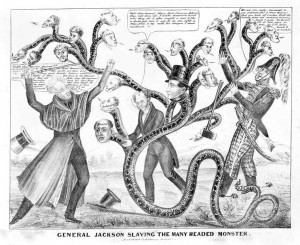 In his historic veto address, Jackson declared war on the wealthy aristocracy attempting to subvert the American Republic.
In his historic veto address, Jackson declared war on the wealthy aristocracy attempting to subvert the American Republic.
His veto address should be read by everyone concerned with freedom and equality of opportunity.
Jackson, in part, stated:
“It is to be regretted that the rich and powerful too often bend the acts of government to their selfish purposes.
“Distinctions in society will always exist under every just government. Equality of talents, of education, or of wealth cannot be produced by human institutions.
“In the full enjoyment of the gifts of Heaven and the fruits of superior industry, economy, and virtue, every man is equally entitled to protection by law; but when the laws undertake to add to these natural and just advantages artificial distinctions, to grant titles, gratuities, and exclusive privileges, to make the rich richer and the potent more powerful, the humble members of society-the farmers, mechanics, and laborers-who have neither the time nor the means of securing like favors to themselves, have a right to complain of the injustice of their Government.
“There are no necessary evils in government. Its evils exist only in its abuses. If it would confine itself to equal protection, and as Heaven does its rains, shower its favors alike on the high and the low, the rich and the poor, it would be an unqualified blessing.”
Jackson’s veto was a shot across the financial-elites broadside and could not remain unanswered, especially when the messenger was the sitting President of the United States of America.
Interestingly, Jackson was not a novice in his understanding of the ill-effects of paper money. In fact, he understood the debilitating effects of inflationary money (having studied at length the South Sea Bubble) better than many of the Eastern elites opposing him. He knew that paper money not backed by bullion was fraud upon the many for the benefit of the few.
Biddle, finally comprehending Jackson couldn’t be bought or bullied declared war, pulling out every political weapon in his extensive arsenal. Biddle purchased propaganda pieces in the newspapers in an attempt to refute Jackson’s charges and rally support for the Bank. For instance, he wrote to one editor,
“If you will cause the articles I have indicated and others which I may prepare to be inserted in the newspaper in question, I will at once pay to you one thousand dollars.”
A thousand dollars then is equivalent to twenty-five thousand today, certainly enough to bribe most editors into action. Biddle’s relentless assault only strengthened Jackson’s belief that the Bank’s influence was unhealthy and detrimental to a republican government.
In truth, money and power are just two sides of the same coin. Consequently, where money gathers, power is soon to follow and where power gathers, money is soon to follow.
Daniel Webster, the famed lawyer and presidential contender from New England, championed the Bank’s cause, becoming one of the Bank’s most ardent supporters. Ironically, although Webster had originally opposed the Bank’s charter, he found Bank religion when Biddle offered him a healthy legal retainer to aid in the re-charter movement.
In the midst of the Bank battle, Webster wrote the a revealing missive to Biddle,
“I believe my retainer has not been renewed or refreshed as usual. If it be wished that my relation to the Bank should be continued, it may be well to send me the usual retainers.”
Webster, along with the champion of the statists American System, Henry Clay, supported the financial-elites in their fight against Jackson as perks, power, and recognition were sure to follow with the Bank’s blessing. Webster, in fact, launched a lengthy attack on the Jackson’s policies, blasting his veto of the Bank.
Biddle, in addition, bought other influencers in Congress to oppose Jackson’s measures, dividing Jackson’s supporters into two camps. The first group desired the President to yield on the issue, hoping to maintain government decorum. In contrast, the second, encourage the President to finish what he started and end the unholy alliance between Big Banks and Big Government.
Jackson’s popularity suffered from the stream of paid propaganda unleashed by editors congenial to Biddle’s seemingly endless financial largesse. Indeed, numerous diatribes against Jackson’s policy permeated the press on a weekly basis.
Despite the funded politicians in Congress and rabid press editors willing to do Biddle’s bidding, he still stored one more ace up his sleeve.
Fearing that Jackson would remove the Treasury deposits from his Bank, starving the bank of the lifeblood of money necessary to maintain its special power base, Biddle declared to Webster,
“They will not dare to remove them. If the deposits are withdrawn, it will be a declaration of war which cannot be recalled.”
Following through on his promise, Biddle launched a campaign of loan closures across America, causing financial panic among the state banks and business community. They were forced to either pay back their loans or collapse into insolvency.
State banks and businesses screamed for relief, appealing to Jackson end the ward and submit to the Bank’s recharter.
Misreading the President again, the numerous bank and business closings only steeled Jackson’s resolve to end Biddle’s undue influence in the American economy.
Many state leaders, awakened by the inordinate power that the Bank held over the economy, began to recognize the truth of Jackson’s veto claims.
In truth, the President believed that any power capable of causing a panic of this magnitude was not healthy for the freedoms of the American people. He denounced the Bank’s action to his cabinet,
“The Bank has by degrees obtained almost entire dominion over the circulating medium, and with it, power to increase or diminish the price of property and to levy taxes on the people in the shape of premiums and interest to an amount only limited by the quantity of paper currency it is enabled to issue.”
Jackson understood the role that money-interest can play in causing inflation and market cycles; unfortunately, this understanding seems lost on today’s politicians and our Federal Reserve System.
Biddle once boasted to an intimate,
“In half an hour I can remove all the constitutional scruples in the District of Columbia. Half a dozen presidencies’ — of bank branches — a dozen cashierships, fifty clerkships, a hundred directorships, to worthy friends who have no character and no money.”
Clearly, Biddle was playing for keeps, understanding that money buys power and power produces money. Even in the midst of the Federal Government’s withdrawal of Treasury Deposits, Biddle remained confident of his ultimate victory, writing,
“My own view of the matter is simply this…The [instigators] of this last assault on the Bank regret and are alarmed by it. But the ties of party allegiance can only be broken by the actual conviction of existing distress in the community. Nothing but the evidence of suffering abroad [that is, in the country as a whole] will produce any effect in Congress…This worthy President thinks that because he has scalped Indians and imprisoned judges, he is to have his way with the Bank. He is mistaken.”
Biddle appears to have succumbed fully to the corrupting effects of absolute power. His dictatorial thoughts, writings, and actions are on display during this stage of the war. He shared with another confidante,
“My own course is decided, all other banks and all other merchants may break, but the Bank of the United States shall not break.”
Biddle truly believed, that by causing harm and suffering in America, he could control the political leaders of our country.
In hindsight, had it been any other President besides Jackson at this time, he would have been right. Jackson, however, stood his ground and eventually won the Bank war, despite receiving many battle scars along the way.
Re-elected in a landslide, Jackson proved that a person with conviction and character can stand his ground and win, no matter the size of the forces aligned against him.
Boldly, at one point in the battle, Jackson told his Vice-President Martin Van Buren,
“The Bank is trying to kill me. But I will kill it.”
Jackson example demonstrates a leader’s powerful effect upon others. When a person has the courage to stand strong, he strengthens the spine of others who recognize the truthfulness of his fight between right and wrong.
Courage, just like lack of courage, is contagious. Character is courage and integrity combined. Integrity is identifying what is right and courage is the ability to stand for truth even when it hurts.
Jackson accomplished many things in his life, both militarily and politically. However, I believe his finest hours were in his courageous stand against the Second National Bank.
May today’s leaders learn similar courage in today’s fight against tyranny.
****************************
 Orrin Woodward co-authored the New York Times bestseller Launching a Leadership Revolution. His first solo book, RESOLVED: 13 Resolutions for LIFE, made the Top 100 All-Time Best Leadership Books List. Orrin was awarded as the 2011 IAB Leader of the Year.
Orrin Woodward co-authored the New York Times bestseller Launching a Leadership Revolution. His first solo book, RESOLVED: 13 Resolutions for LIFE, made the Top 100 All-Time Best Leadership Books List. Orrin was awarded as the 2011 IAB Leader of the Year.
Orrin has co-founded two multi-million dollar leadership companies and serves as the Chairman of the Board of the LIFE Business. He has a B.S. degree from GMI-EMI (now Kettering University) in manufacturing systems engineering. He holds four U.S. patents, and won an exclusive National Technical Benchmarking Award.
He follows the sun between residences in Michigan and Florida with his lovely wife Laurie and their children. Orrin’s leadership thoughts are shared on his blog, orrinwoodwardblog.com.






This is a great article and inpiring leadership axample to live with convitions and character no matter what!!!! Thank u!!
It’s hard to believe we are worse off than ever before in our country’s history, yet people as a whole are less aware and more appothietic then any previous generation, Thank You for some clarity and a wake up call